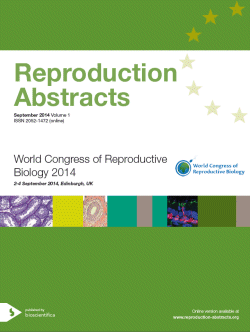Searchable abstracts of presentations at key conferences on reproductive biology and medicine

World Congress of Reproductive Biology 2014
Edinburgh,
UK
02 Sep 2014 - 04 Sep 2014

World Congress on Reproductive Biology 2014, 02 - 04 September 2014; Edinburgh, UK
SYMPOSIA
Embryo
ra0001s016 | Embryo | WCRB2014
Characterization of gene expression in 1-cell stage embryos
Before fertilization, oocyte genome is not transcribed and this transcriptionally silent state continues after fertilization. It is known that in mice, the first gene expression in the life occurs at mid-1-cell stage and the expression pattern dramatically alters during development following the program of gene expression. However, the profile of transcribed genes and the mechanism regulating their expression at the 1-cell stage has not been clarified, since the amount of zygo...
ra0001s017 | Embryo | WCRB2014
Effect of transcriptional regulation on early embryo development
A large number of embryos are produced both in human and domestic animals using assisted reproductive technologies (ART) including in vitro fertilization, but the majority of embryos fail to develop to the blastocyst stage and/or implant during early embryo development. However, the causes of the developmental failures and early miscarriage are not well defined in human and other mammals. Blastocyst stage is critical to the manipulation and/or selection of embryos for...
ra0001s018 | Embryo | WCRB2014
Epigenetic reprogramming to form the pluripotent inner cell mass
Reprogramming of DNA methylation patterns in the early embryo is required for normal development. A longstanding paradigm of global loss of 5′-methylcytosine (5meC) over the first few cell-cycles of early development has recently been challenged (Li & ONeill 2012, Li & ONeill 2013)1,2. Here we show that immuno-detectable levels of 5meC and 5′-hydroxymethylcytosine (5hmC) persist throughout zygotic maturation and the first cell-cycles ...



